 BTS return with their album, Love Yourself: Answer, on the 24th of August, following Love Yourself: Tear. Already, it has broken records for the number of pre-orders, adding to the ever-growing list of achievements by the 7-member group.
BTS return with their album, Love Yourself: Answer, on the 24th of August, following Love Yourself: Tear. Already, it has broken records for the number of pre-orders, adding to the ever-growing list of achievements by the 7-member group.
Throughout their rise, many have pondered the secret to BTS’ success. Numerous factors have been suggested, but it has been the remarkable luck – serendipitous, even – and a combination of factors that have been responsible. That is to say, a combination of all the right people at the right time in the right place. But what exactly does that mean?
From the inception of their company, Big Hit Entertainment, pieces of the puzzle were already falling into place. In 2005, Big Hit’s CEO and mastermind, Bang Si-hyuk, left his job at JYP Entertainment as a producer to form his own company, Big Hit Entertainment. Soon after, he recruited the then-unknown producer Pdogg and choreographer Son Sung-deuk. In case you don’t know, Pdogg is the producer behind the bulk of BTS’ discography, including the majority of their singles. Son Sung-deuk is the director behind their performances, providing choreography for songs like “N.O” and turning choreography videos sent by foreign choreographers into tightly coordinated stages ready for the K-pop market.
All three would become important figures in BTS’ career, nurturing their skills as trainees and working closely after debut to produce high-quality music and performance. For this, they would earn fame as the brains behind BTS. As such, the fact that they came together at Big Hit, still relatively unknown, was already a stroke of luck.

Big Hit was a small company with a small staff and an even smaller roster of artists, suffering disadvantages in terms of financial resources and established reputation compared to larger companies. This may well have been a blessing in disguise, as they ended up trying different marketing strategies (social media) and following trainees’ individual strengths, instead of adhering to a ‘house’ style (hence why BTS was a hip-hop group in the first place).
This would be the ideal environment in which the members flourished. In 2010, Pdogg discovered RM through rapper Sleepy‘s recommendation. The other members were then cast with the aim of creating a hip-hop group. Here, too, lies a number of happy coincidences: V was cast after accompanying a friend to their audition, Jin after being seen alighting a bus, and Jungkook after unexpectedly choosing Big Hit over a number of larger companies.
In December 2012, they posted their first tweet, beginning the social media journey that would prove instrumental to their success. They also started posting vlogs on their YouTube channel, something which was exceptionally rare for K-pop groups at the time. After six months of grassroots marketing, BTS debuted with the single, “No More Dream”. Much of the groundwork was already laid for their future popularity, largely because they had chosen the right time to debut and had the right people to pull it off.
The Right Time
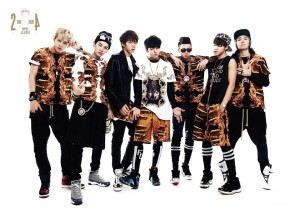
In 2013, K-pop was already popular enough to have organised fanbases on hand to translate and share content from their favourite groups. What had previously been an obscure genre of music had reached a global audience larger than ever, helped by the viral popularity of Psy’s “Gangnam Style”. Groups like Big Bang had built a solid foundation, but fans were also ready for new faces.
Hence, the market became saturated: groups debuted in abundance, producing unremarkable pop music with similar visuals and dancing. Only innovative concepts stood out, among them the “hip-hop idol”. This reflected the crossing over of hip-hop into the mainstream, reinforced by shows like Show Me The Money. The idea of hip-hop idols had garnered skepticism, but successful groups like Block B and B.A.P had managed to refute this. BTS was one of several that decided to follow the same strategy.
 The two years after debut were critical, as they are for most. Within the company, BTS benefited from the increased attention that resulted from the disbandment of labelmates GLAM and 2AM in 2014. Outside the company, many of their competitors went on hiatus, allowing BTS to gain a foothold: Big Bang took a two-year break after their 2012 album “Alive”, Block B were inactive through 2015 and B.A.P – whose concept in many ways overlapped with BTS’, releasing darker hip-hop-influenced songs with powerful lyrics on social issues – took a hiatus in 2014.
The two years after debut were critical, as they are for most. Within the company, BTS benefited from the increased attention that resulted from the disbandment of labelmates GLAM and 2AM in 2014. Outside the company, many of their competitors went on hiatus, allowing BTS to gain a foothold: Big Bang took a two-year break after their 2012 album “Alive”, Block B were inactive through 2015 and B.A.P – whose concept in many ways overlapped with BTS’, releasing darker hip-hop-influenced songs with powerful lyrics on social issues – took a hiatus in 2014.
Big Hit also chose a great time to apply the “content is king” marketing strategy. Since debut, BTS have consistently put out lots of high-quality content, even when not promoting, giving fans no chance to forget about them. Between their tweets (on average 4.3 per day), vlogs, variety shows, song covers, Festa activities and later on their V Live videos, rarely a week has gone by without any BTS-related content coming out. Crucially, most of it is available translated on YouTube or another widely used platform, not hidden behind a paywall or language barrier. This means new fans can easily find a wealth of content, keeping them entertained for literally days. Many emerge after this content binge as dedicated fans, ready to shell out money and time on their new favourite group.
 Their social media is particularly interesting. BTS’ strategy of having all 7 members use one account gets people used to seeing them together, reinforcing their identity as a team, as well as displaying their chemistry and personalities. It’s a marketing tool as much as a personal sharing outlet – one which has gained them 15 million followers.
Their social media is particularly interesting. BTS’ strategy of having all 7 members use one account gets people used to seeing them together, reinforcing their identity as a team, as well as displaying their chemistry and personalities. It’s a marketing tool as much as a personal sharing outlet – one which has gained them 15 million followers.
Contrast this with other groups’ social media. Some, such as Seventeen, use only official accounts, which offer fans somewhat run-of-the-mill marketing information interspersed with the occasional company-approved selfie. Others with the luxury of personal accounts tend to open them individually, as is the case with EXO, B.A.P and Big Bang, among many others. While this in itself is perfectly understandable, from a marketing perspective it emphasises their individual identity over that of the group’s. Additionally, it may put off casual fans who aren’t interested in any individual member.
It’s also worth noting their platform of choice – Twitter, over the more commonly used Instagram. Though popular internationally, Twitter was not widely used in Korea, meaning they had less competition for attention, at least internationally. You can also “retweet” a tweet, whereas you can’t “regram” an Instagram post (easily). This got BTS on people’s timelines and spread their name around, thanks to the topical nature of Twitter.
These factors helped BTS gain a substantial Internet following. Over time, the importance and recognition of Internet popularity would only go up, as BTS later proved.
The Right People
 The right timing would not be enough without the right people. BTS had an excellent team from the beginning, on and off the stage, creating quality music, performance, MVs and offstage content.
The right timing would not be enough without the right people. BTS had an excellent team from the beginning, on and off the stage, creating quality music, performance, MVs and offstage content.
Pdogg maintained the consistency and uniqueness of their songs through the years with his production, helped by the members’ songwriting contributions. Each had their own distinctive style, creating a signature sound that was not easily copied or reduced by changing producer or genre. For listeners who liked it, it created interest in their future music. Not that their discography was perfect; with strong hip-hop and trap influences for the first two albums, their music style wasn’t very accessible to the public. This resulted in low-charting singles, especially as they were competing with songs by more established groups like Block B’s “Very Good”, EXO’s “Growl” and B.A.P’s “One Shot”.
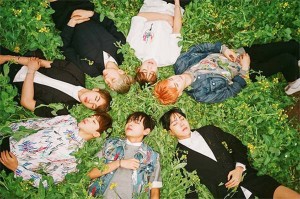 What they did have, though, was a passion for music and a willingness to try new things. In 2015, BTS released “I Need U”, which marked a change in music style to incorporate trendier Westernised production and catchier melodic hooks – something they have continued to follow since. Stepping away from their previously more aggressive sound, their music became more accessible without losing their signature style, earning them a well-deserved first music show win.
What they did have, though, was a passion for music and a willingness to try new things. In 2015, BTS released “I Need U”, which marked a change in music style to incorporate trendier Westernised production and catchier melodic hooks – something they have continued to follow since. Stepping away from their previously more aggressive sound, their music became more accessible without losing their signature style, earning them a well-deserved first music show win.
This ability to spot trends, take risks and keep on the cutting edge of music meant BTS maintained a difficult balance between consistency and growth. Throughout the years, they more or less kept their music from stagnating, all while bringing in new fans and without alienating their core audience. Most idols aren’t musicians and don’t have the skills to create good songs for themselves, meaning they are completely reliant on their company. Depending on the company’s coffers, motives, and musical tastes, they might give groups songs that are not suited to them, too inconsistent in genre to keep fans, or just plain bad (that’s if they give them any songs at all). BTS had enough songwriting ability to prevent this, and Big Hit allowed enough creative freedom to let them.

Of course, you can’t discuss BTS without mentioning dance. Led by Son Sung-deuk, BTS helped raised the bar for idol dancing, displaying intricate lyrical choreography with dynamic transitions and formations that set them apart from most groups at the time.
This was a mix of hard work and good timing; when BTS debuted, most groups danced well and the only way to stand out was to be even more in sync and do even more impressive moves. BTS pulled it off with an impressive work ethic, matching complex sequences with military precision – something that cannot be achieved with just dance talent. As one of the first to do this, they had an advantage, along with contemporaries like EXO and VIXX. Nowadays, that level of dancing is to be expected, thanks to the difficult (and sometimes downright dangerous) choreography that has been shown by groups since.
Another important aspect is BTS’ storytelling. Lyric-wise, BTS have consistently shown startling creativity, with concepts that are humorous, philosophical or just totally unconventional. This lyrical richness kept songs entertaining even when the actual music was quite typical. Songs like “N.O” and more recently “Anpanman” and “Go Go” had unusual and interesting lyrics that few would come up with, written in a frank, unpretentious way that was easy to understand, yet often clever. Crucially, they sounded like BTS’ own words and not lyrics handed to them on a sheet of paper.
From flaws in the school system, materialism in branded clothing, to their own raging hormones, BTS have never shied away from unconventional topics, and in doing so have achieved relatability for their teens-to-twenties audience that typical love songs often don’t. Writing in an endearingly honest way, they’ve hit sensitive points with surprising accuracy, creating emotional connections with their listeners and making their songs memorable beyond the music.
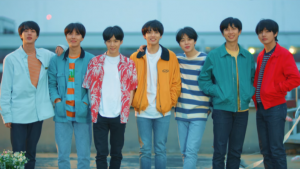
Their storytelling became even more powerful with the integration of story-based MVs. The large-scale story and world that BTS introduced from “I Need U” onwards outmatched anything that had gone before. They continued the story with ever more artistic and cryptic videos, building a dark alternate universe and mysterious plot that brought the element of lore into the fandom. As proved by franchises such as Harry Potter and Five Nights At Freddy’s, lore or a good story can create as much hype as good music or popular members, and BTS had all three.
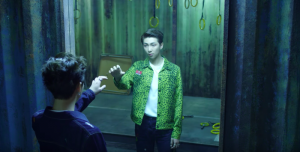 It was a risky move that would confuse viewers and required long-term commitment with no guarantee of success. The fact that they persisted showed Big Hit’s, BTS’ and Lumpens’ faith in each other, as well as an aligned desire to tell meaningful stories, however confusing for viewers it might be. Of course, every video was as aesthetically pleasing and well-made as any K-pop MV; even if fans weren’t interested in the lore, few would fail to enjoy the visual feasts that many of their videos were.
It was a risky move that would confuse viewers and required long-term commitment with no guarantee of success. The fact that they persisted showed Big Hit’s, BTS’ and Lumpens’ faith in each other, as well as an aligned desire to tell meaningful stories, however confusing for viewers it might be. Of course, every video was as aesthetically pleasing and well-made as any K-pop MV; even if fans weren’t interested in the lore, few would fail to enjoy the visual feasts that many of their videos were.
Contrasting with their dark MVs are their public personas. When it comes to their success as public figures, authenticity, sincerity, and relatability are key. From their humour to their vlogs and lyrics, BTS openly express their thoughts and emotions, where others play it safe or maintain a distance with fans. This results in what feels like knowing them personally, rather than as unreachable celebrities.
An example is their “Bangtan Bombs” – short clips often no more than a minute long that show the members doing ridiculous or funny things, i.e. perfect for social media. These made the rounds on sites like Tumblr, picking up fans as they went due to the good chemistry between the members, endearingly close friendships, and general meme-worthiness. They showed interesting personalities that played off each other well, with antics that were consistently entertaining in an Internet-friendly, meme-like way.
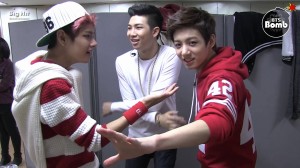
To a large extent, Big Hit’s management decisions were behind the above-mentioned factors. Bang Si-hyuk explained that Big Hit trainees are given independence and must be totally self-motivated with regards to training. Anyone who does not love music is also “unconditionally disqualified” – it’s not enough just to love performing or to want to be famous. This meant that the eventual members of BTS would be hard-working, taking responsibility for both their music and their personal development. This in turn led to music and performance that was consistently high in quality, helped by Bang Si-hyuk’s own experience as a musician.
The Result
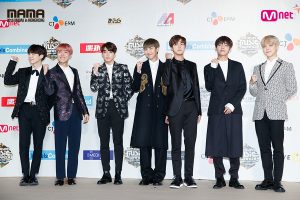 Put all these together and you get a phenomenal success story. In 2016, BTS won their first Daesang – notable as they are generally won by artists from bigger companies. This solidified their underdog story – an impressive underdog-to-winner narrative that makes people root for them, whether long-time fan or new discoverer of K-pop.
Put all these together and you get a phenomenal success story. In 2016, BTS won their first Daesang – notable as they are generally won by artists from bigger companies. This solidified their underdog story – an impressive underdog-to-winner narrative that makes people root for them, whether long-time fan or new discoverer of K-pop.
From here, the rest is history. Having gained enough momentum, their popularity would continue to snowball, provided they continued with the same formula as before – funny, authentic personalities and chemistry, easily accessible and plentiful offstage content, sincere fan interaction, quality music and performance, good storytelling and continual growth while maintaining their core identity (e.g. solos and collaborations).
 In 2017, they won Billboard’s Top Social Artist award, a fan-voted award based mainly on Twitter that allowed them to capitalise on their large Twitter presence. With it came a slew of American interviews and TV appearances, and BTS have been steadily approaching global celebritydom ever since.
In 2017, they won Billboard’s Top Social Artist award, a fan-voted award based mainly on Twitter that allowed them to capitalise on their large Twitter presence. With it came a slew of American interviews and TV appearances, and BTS have been steadily approaching global celebritydom ever since.
Overall, it has been tremendous luck with putting people together at the right time that has led to the birth and steady growth of BTS. Many have tried to follow similar strategies, but given the luck involved, it’s not a formula that just anyone could copy to achieve the same results.
Bang Si-hyuk, Pdogg and Son Sung-deuk are key figures, as their values regarding music and personality were what meant the chosen members would be as they were. This and their own hard work meant that the BTS success story would be as much theirs as it was BTS’. Even Lumpens could be included here – BTS’ MVs have been some of his most successful and they were one of the first and few idol groups he worked with.
 Of course, you can’t discount the members themselves. Talented with fairly distinctive styles, all would likely have seen some success had they debuted in other groups, but it’s doubtful any would have matched BTS’ ascent. Rather, it’s the serendipitous combination of members – the complementariness of their skills and personalities and, in particular, their aligned attitudes towards music, fans, and hard work – that has led to such outstanding onstage and offstage content.
Of course, you can’t discount the members themselves. Talented with fairly distinctive styles, all would likely have seen some success had they debuted in other groups, but it’s doubtful any would have matched BTS’ ascent. Rather, it’s the serendipitous combination of members – the complementariness of their skills and personalities and, in particular, their aligned attitudes towards music, fans, and hard work – that has led to such outstanding onstage and offstage content.
Combined with the technology that has allowed them to share that content with the world, lucky timing and the openness that has invited fans in to become a part of their family, they have created a phenomenon. They may refer to serendipity only in song, but actually, BTS’ story has been one of enormous serendipity; it’s hard to shake the feeling that the stars aligned to bring BTS to the world.
(Images via Big Hit Entertainment, Mnet, Seven Seasons, Twitter, BANGTANTV. Sources: Korea JoongAng Daily, Study Breaks, No Cut News [Trans], Weiv: [1] [2], BTS: Icons of K-pop by Adrian Besley)


